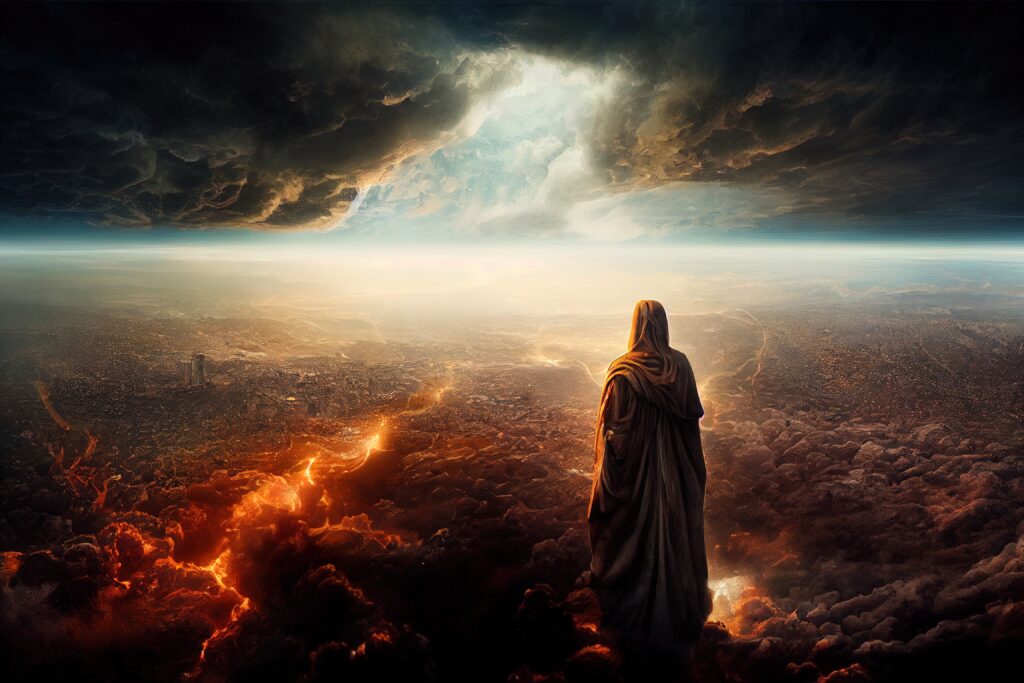
In the Spirit on the Lord’s Day.
I was in the Spirit on THE LORD’S DAY, and I heard a loud voice like a trumpet behind me. Rev 1:10
Patmos is a barren, rocky island in the Aegean Sea; it is six Kms long and 4Kms across its widest part. The Romans used it, together with other surrounding islands, as a penal colony for banished political offenders. Early Christian authors living relatively close to the time of the writing of the book of Revelation state unanimously that the Emporer Domitian had banished John to Patmos because of his faithfulness to the gospel in AD 94. According to Tertullian ( writing 100 years after the event) John was banished after being plunged into boiling oil in Rome and suffering nothing from it. On Patmos, the aged apostle surely endured all the hardships of Roman imprisonment. He probably was treated as a criminal, chained in fetters, given insufficient food, and forced to perform hard labour under the lash of the whip of merciless Roman guards. Maybe, because of his advanced age this was not the case.
Regardless of how he got there, to the servant of God this gloomy abode became the gate of heaven. Here, shut away from the busy scenes of life, and from the active labours of former years, he had the companionship of God and Christ and the heavenly angels, and from them he received instruction for the church for all future time.
The followers of Christ should never forget that whenever they find themselves in circumstances like those of John, they are not left alone.
The same Jesus who came to John with the words of hope and encouragement during his hardship on Patmos still is present with His people to sustain and support them in their difficult situations.
When considering today’s text we should note that no biblical belief should be built on one text alone, because the text can be looked at in several different ways. This is the only text in the New Testament that uses this phrase. So, what did John mean by the “Lord’s Day?” When was it that John received his vision? There are 3 options that scholars put forward for understanding this text.
The first option is the day we call Sunday. Christian writings from the Second Century (as close as 35-40 years after the book of Revelation) clearly use the phrase “the Lord’s Day” as a figure of speech for Sunday. The idea arose in relation to the fact that Jesus rose from the dead on the first day of the week (our Sunday), so “the Lord’s Day” could be a reference to that. But there is no evidence that Christians in the First Century ever kept Sunday as a replacement for the fourth commandment or honoured it as a memorial of the resurrection. There is not one New Testament verse that can be put forward for the idea. There are, however, countless examples of Christians keeping the seventh day Sabbath of the commandment. (e.g. Acts 13:42. Revelation 14:7 even quotes the Sabbath commandment from Exodus 20:11 word for word. Revelation 14:6-12 is talking about the last warning message to go to all the world as we will later see.)
Secondly, perhaps John had in mind the Old Testament ‘Day of the Lord,’ a phrase used in the Bible for God’s great intervention at the end of earth’s history. The appearance of “a trumpet” in this verse, which is a judgement symbol, makes this an option. This term is used in places like Amos 5:18 and Joel 2:1.
Thirdly, it could have been the day we call Saturday. Saturday is the seventh day of the week on the Hebrew calendar, known to the Jews and some Christians as the Sabbath. The Sabbath is often called “the Lord’s Day.” In Isaiah 58, The Lord Himself speaks of the Sabbath as “my holy day.” And in Mark 2:27-28 Jesus declares that He is the “Lord of the Sabbath.” So a strong biblical option for understanding John is that he was alluding to these earlier texts to identify the Sabbath as the day on which the vision came. Exodus 31:13, Isaiah 58:13 and Mathew 12:8 and Mark 2:28 all specify which ‘day’ is the Lord’s
Undoubtedly, it was on the Sabbath that the Lord of glory appeared to the exiled apostle. The Sabbath was as sacredly observed by John on Patmos as when he was preaching to the people in the towns and cities of Judea. He claimed as his own the precious promises that had been given regarding that day.
Revelation 1:10 clearly suggests that the apostle John received the vision on the seventh-day Sabbath. Although looking with anticipation toward future events, even to the second coming of Christ (compare with Rev. 1:7), which is called “the day of the LORD” (Isa. 13:6-13; 2 Pet. 3:10), John was talking about the time at which he, himself, had the vision of these future events, and that was on the Sabbath, the “Lord’s day”.
There is no question that amid his sufferings this vision-filled Sabbath must have become to him a foretaste of a life free from suffering, which he and the faithful of all ages will experience after the Second Coming. Indeed, in Jewish thinking the Sabbath is deemed as a foretaste of, “the world to come”.
The Sabbath, which God had instituted in Eden, was precious to John on the lonely isle. What a Sabbath was that to the lonely exile, always precious in the sight of Christ, but now more than ever exalted! Never had he learned so much of Jesus. Never had he heard such exalted truth.

Lord thank you for never letting us forget the Sabbath and for giving us enough places in the Bible so that we can read and study to know that the Sabbath is still the Sabbath today